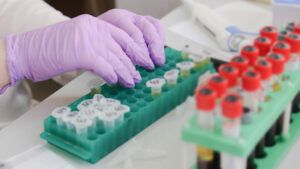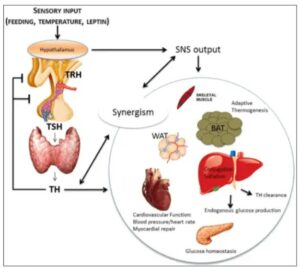$375.00

Hypothyroidism is one of the most common hormone imbalances in the World.
Your thyroid controls and regulates a number of very important systems in your body.
Because of this, your thyroid may be one of the most important hormonal systems in your body.

How
Type of sample to be collected:
Blood (venipuncture—a needle is used to draw blood from a vein)
Thyroid Disorder Monitoring, Ongoing Test Panel measures the levels of TSH and T4 in your blood. These markers help determine whether your current treatment plan is working properly for your thyroid disease. This test is intended as an additional follow-up to our Thyroid Disorder Monitoring, Initial Test Panel.
This testing option is intended for patients with a known thyroid function disorder and may be recommended by a physician as a follow-up to our Thyroid Disorder Monitoring,
Initial Test Panel once treatment has started.
PLEASE NOTE
Noticeable changes in your metabolism (weight, temperature, and energy) may be a sign or symptom that there is too much or too little TSH in your blood. If TSH levels are too high or too low, this may indicate your thyroid is overactive (hyperthyroidism) or underactive (hypothyroidism). With this test panel, TSH and T4 blood levels are measured to help accurately determine whether your treatment dosage is providing the correct level of support.
This panel does NOT test for thyroid peroxidase (TPO) antibodies in your blood.
What’s Tested
The thyroid is a butterfly-shaped gland in the front of the neck. Thyroid function is controlled by the pituitary gland, which produces TSH in the blood. TSH stimulates the thyroid gland to produce thyroid hormones (T3 and T4). TSH will also tell the body to make or release thyroid hormones. This process determines how quickly your body uses energy, makes proteins, and controls other important functions:
Our Thyroid Disorder Monitoring: Ongoing test panel measures the levels of TSH and T4 in the blood to help evaluate thyroid function. Low levels of TSH in the blood may indicate an overactive thyroid gland, commonly referred to as hyperthyroidism. High levels of TSH in the blood may indicate an underactive thyroid gland, commonly referred to as hypothyroidism. Both conditions may require medical treatment. Thyroid disorders can affect any system of your body and treatment will depend on the specific thyroid condition. An undiagnosed thyroid disorder may put you at risk for cardiovascular diseases, osteoporosis, infertility, and other serious conditions but most thyroid conditions can be managed with medication.
Signs & Symptoms
Symptoms of thyroid disorders can be mild, moderate, or severe and often resemble other medical conditions. You may consider getting a thyroid function test if you’re experiencing the following symptoms: Hypothyroidism (underactive thyroid) symptoms can include:
Hoarseness Hyperthyroid (overactive thyroid) symptoms can include:
Preparing for your test
You do not need to do anything special to prepare for the sample collection. Fasting is not required for this test.
